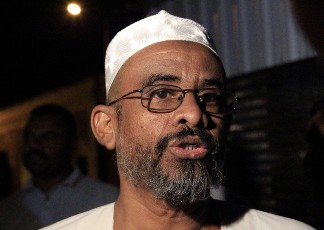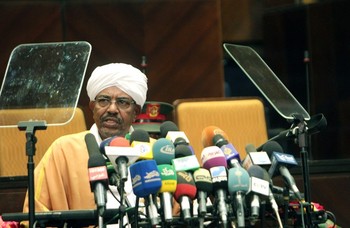Sudan’s Bashir orders release of political detainees
April 1, 2013 (KHARTOUM) – Sudanese president Omer Hassan al-Bashir said on Monday that he has ordered the release of all political detainees in the country, although it remains unclear whether the decree would include rebel fighters and high-level officials currently on trial for plotting a coup to overthrow the government.

He stressed that the ruling National Congress Party (NCP) stood willing to hold talks with all political and social forces without exclusion, including armed movements.
Analysts, however, said it remained unclear how the government would define political detainees and how their release would be coordinated.
Seven political prisoners were released late on Monday night following the announcement, including six prominent members of opposition political parties that participated in signing the ‘New Dawn’ charter.
This included leader of the Islamic Wasat Party Yousif al-Koda, Brigadier Abdel-Aziz Khalid from the National Sudanese Alliance, Hisham al-Mufti from the United Democratic Unionist Party, Intisar al-Aqli from the Socialist Unionist Nasserite Party, as well as Mohamed Zein al-Abdeen and Abdel-Rahim Abdullah from the Democratic Unionist Party.
Youth activist Hatim Ali Abdalla, who had been detained incommunicado since his arrest on 24 March after taking part in a peaceful demonstration at the Khartoum Bahri Teaching Hospital, was also among the group released.
The ‘New Dawn’ charter signed by most Sudanese opposition parties and all major rebel groups calling for toppling the Bashir government and restructuring the state institutions. The government called a western plot seeking to eradicate Sudan’s Arab-Islamic identity.
‘OLD MILK’
The Sudan People’s Liberation Movement-North (SPLM-N) secretary-general Yasser Arman described Monday’s speech by Bashir in front of the national assembly as “old milk in a new bottle.”
He said the actual number of political detainees is much larger than those whom Bashir will ultimately release, saying there are more than 600 prisoners whose whereabouts remain unknown including at least 138 from Blue Nile, 240 from the Nuba Mountains and the rest being from Darfur and other places.
Arman further noted that said army and security officers accused of participating in the failed coup last year had also been denied access to proper legal representation.
“This issue has not been addressed and the laws that allow the unlawful detentions are still in place”. Arman said.
“The only new thing is that the General [Bashir] is going to release some of the political detainees while keeping the same laws that detained them and that can detain them again or detain others, and calling for the opposition to join him in an empty constitutional process that will give him legitimacy and renew his license and his political group to rule Sudan, keeping the status quo and without addressing the fundamental issues,” he added.
At a rare news conference last week, Sudan’s first vice president, Ali Osman Mohammed Taha, called for national dialogue on the matter, but the request was rejected by the alliance of opposition parties and the SPLM-N.
Sudan must draw up a new constitution to replace the 2005 document based on the CPA which ended a 23-year civil war and led to South Sudan’s separation in July 2011.

Bashir’s regime had long rejected negotiations with SPLM-N insurgents active in the area, who have been fighting the Khartoum regime for almost two years.
However, last month Sudanese officials expressed their readiness to sit down with SPLM-N representatives on the basis of the 2005 Comprehensive Peace Agreement (CPA).
However, Arman maintains that the proposed constitutional process by the NCP will not end ongoing conflicts or address the fundamental issues of democratic transformation.
“Sudan needs a credible constitutional process that will address the humanitarian and human rights situations, end the war and usher the Sudanese people, political parties and civil societies on an equal footing into a national constitutional process that will answer the fundamental question, ‘how Sudan is going to be governed’ instead of ‘who is going to govern Sudan’”, he said.
For the constitutional process to be meaningful, the Sudanese government has to bring an end to the war in Blue Nile and South Kordofan, and Darfur in the far west “and to enable the political armed organisation and the regions where war is occurring to participate effectively in any credible constitutional process”, Arman added.
In his speech, Bashir reiterated Sudan’s keenness to establish balanced relations with the state of South Sudan based on the cessation of hostilities, border security and other mutual benefits, further underlining that each party must commit itself to the conditions of a cooperation agreement signed earlier this year in Ethiopian capital Addis Ababa.
Last September, both Sudan and South Sudan signed a series of agreements, covering oil, citizenship rights, security issues, banking, and border trade among others.
After a series of setbacks and disagreements, the two countries finally signed an implementation matrix last month to carry out the terms of the agreements.
Bashir further claimed his country’s “moderate and balanced” foreign policy meant it had managed to avoid the internationalisation of outstanding issues with South Sudan, thus keeping them within Africa’s realm.
The Sudanese leader said that the performance of the Sudanese economy had “surprised” analysts who had predicted the country’s economic collapse after the South seceded in July 2011, pointing out that the economy maintained a 1.4% growth rate in 2012, with that figure expected to rise to 3.6% in 2013.
Sudan’s economy took a direct hit following South Sudan’s secession, leading to sharp increase in inflation rates and prices of basic commodities.
The issue was further compounded when South Sudan shut down oil exports following a bitter disagreement over the cost of using Sudanese pipelines to pump its oil to foreign markets.
Both countries are heavily reliant on crude remits and pipeline fees to pay for food imports.
In his speech, Bashir stressed the vital role of media, indicating that the government has increased radio and TV broadcasting, as well as the number of newspapers. He pointed out that the government is open to criticism but doesn’t tolerate those who “take advantage of freedom in order to create anarchy and cross the red lines”.
Bashir said that 91 companies are currently exploring various kinds of metals and that 13 of them had reached the stage of production, pointing out that traditional mining revenues during 2012 amounted to $ 2.2 billion.
Bashir further explained that growth rates in agricultural production has increased by 5.7% compared to last year, pointing out that the contribution of the sector had reached 34.8% of the Gross Domestic Product (GDP), and that Sudan is now self-sufficient of sorghum.
(ST)
